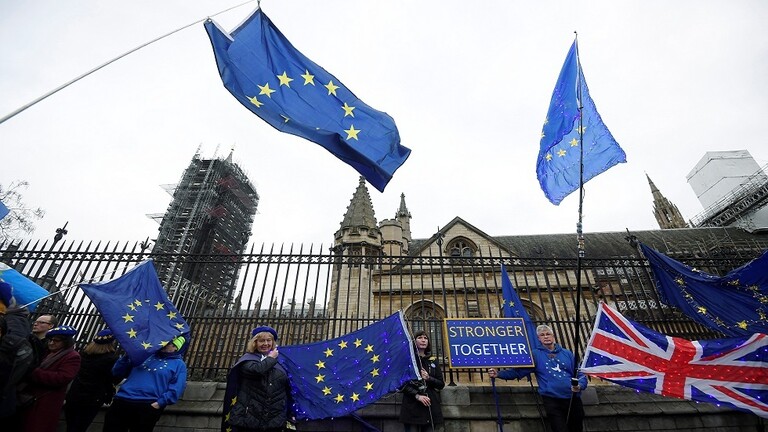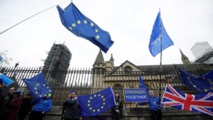"I don't think we're actually that far apart, but what we need now is to see a bit of oomph in the negotiations," Johnson added.
With just over six months left to strike a deal before EU rules cease to apply in Britain, both sides agreed to step up their timetable of talks in July and introduce "new momentum", according to a rare joint statement.
Brussels and London say they want to avoid a "no-deal" Brexit - Britain leaving the EU's regulatory system without an agreement in place - but have so far made little progress in striking a crucial trade deal.
Britain formally left the bloc on January 31, after a slim majority voted to leave the European Union in a 2016 referendum. However, this year's scheduled transition period of 11 months does not bring any major changes.
Disagreement on the extent of British compliance with EU standards, fisheries, and police and justice cooperation have all proved to be stumbling blocks in the recent negotiations.
"We will revitalise and intensify talks in July to find an agreement before the end of the year," von der Leyen said after the hour-long call.
Despite the optimistic tone on Monday, a huge gulf will likely need to be bridged and entrenched positions adjusted in order to advance.
The EU insists that Britain must stick to many of the bloc's rules if it wants to keep its unfettered access to the single market - so-called "level playing field" assurances - and accuses London of failing to accept the consequences of leaving.
Britain, meanwhile, charges the EU with intransigence and says it hasn't left the union in order to be bound by its rules in future.
If Britain leaves without a deal, customs checks and other trade barriers will be reimposed.
Many business groups and opposition politicians had urged Johnson to ask Brussels for more time in light of the lack of progress in talks that have been overshadowed by the coronavirus crisis.
Cabinet chief Michael Gove, Britain's senior minister for Brexit, confirmed that his country would not request an extension last week, in line with the centre-right government's long-standing policy.
Both sides took note of Britain's decision not to seek an extension of the transition period, according to the joint statement.
Moving forward, negotiating efforts focus on, "if possible, finding an early understanding on the principles underlying any agreement," the joint statement read.
European Council President Charles Michel and the President of the European Parliament, David Sassoli, also took part in the talks.
The partners have set a new timetable for their negotiations in July, holding talks every week for five weeks, with a mix of formal rounds and smaller face-to-face groups in London and Brussels.
With just over six months left to strike a deal before EU rules cease to apply in Britain, both sides agreed to step up their timetable of talks in July and introduce "new momentum", according to a rare joint statement.
Brussels and London say they want to avoid a "no-deal" Brexit - Britain leaving the EU's regulatory system without an agreement in place - but have so far made little progress in striking a crucial trade deal.
Britain formally left the bloc on January 31, after a slim majority voted to leave the European Union in a 2016 referendum. However, this year's scheduled transition period of 11 months does not bring any major changes.
Disagreement on the extent of British compliance with EU standards, fisheries, and police and justice cooperation have all proved to be stumbling blocks in the recent negotiations.
"We will revitalise and intensify talks in July to find an agreement before the end of the year," von der Leyen said after the hour-long call.
Despite the optimistic tone on Monday, a huge gulf will likely need to be bridged and entrenched positions adjusted in order to advance.
The EU insists that Britain must stick to many of the bloc's rules if it wants to keep its unfettered access to the single market - so-called "level playing field" assurances - and accuses London of failing to accept the consequences of leaving.
Britain, meanwhile, charges the EU with intransigence and says it hasn't left the union in order to be bound by its rules in future.
If Britain leaves without a deal, customs checks and other trade barriers will be reimposed.
Many business groups and opposition politicians had urged Johnson to ask Brussels for more time in light of the lack of progress in talks that have been overshadowed by the coronavirus crisis.
Cabinet chief Michael Gove, Britain's senior minister for Brexit, confirmed that his country would not request an extension last week, in line with the centre-right government's long-standing policy.
Both sides took note of Britain's decision not to seek an extension of the transition period, according to the joint statement.
Moving forward, negotiating efforts focus on, "if possible, finding an early understanding on the principles underlying any agreement," the joint statement read.
European Council President Charles Michel and the President of the European Parliament, David Sassoli, also took part in the talks.
The partners have set a new timetable for their negotiations in July, holding talks every week for five weeks, with a mix of formal rounds and smaller face-to-face groups in London and Brussels.









 Home
Home Politics
Politics











